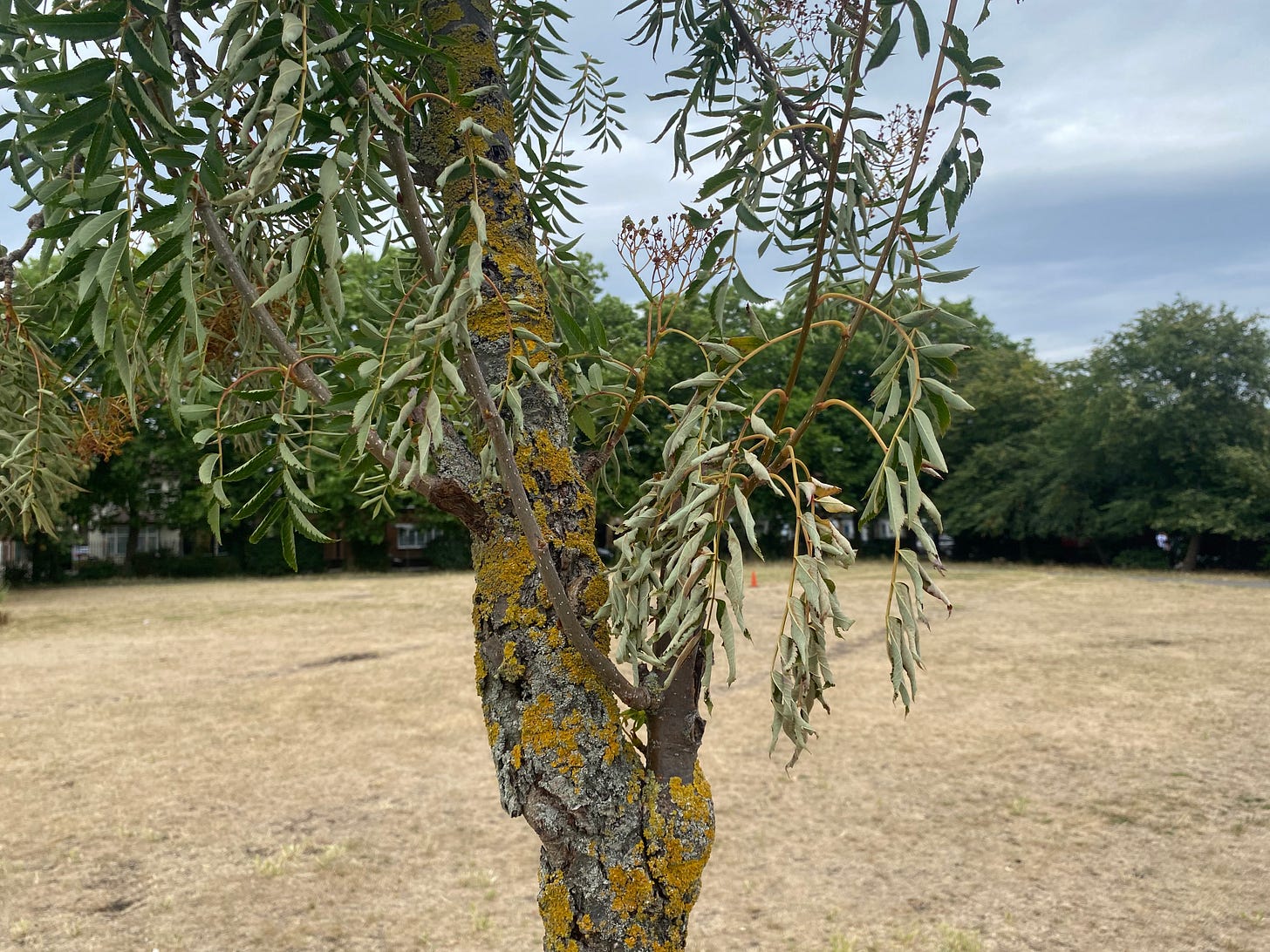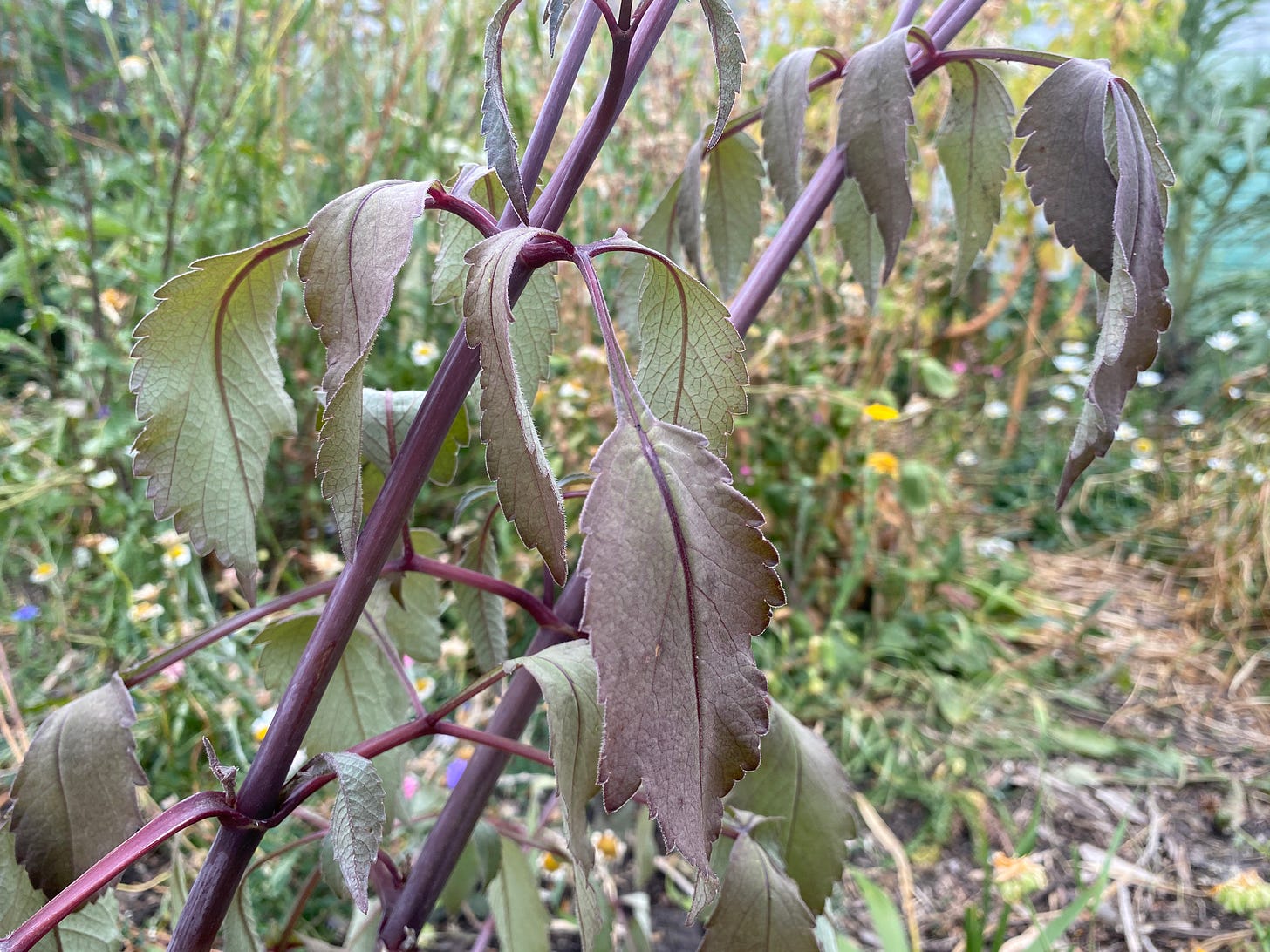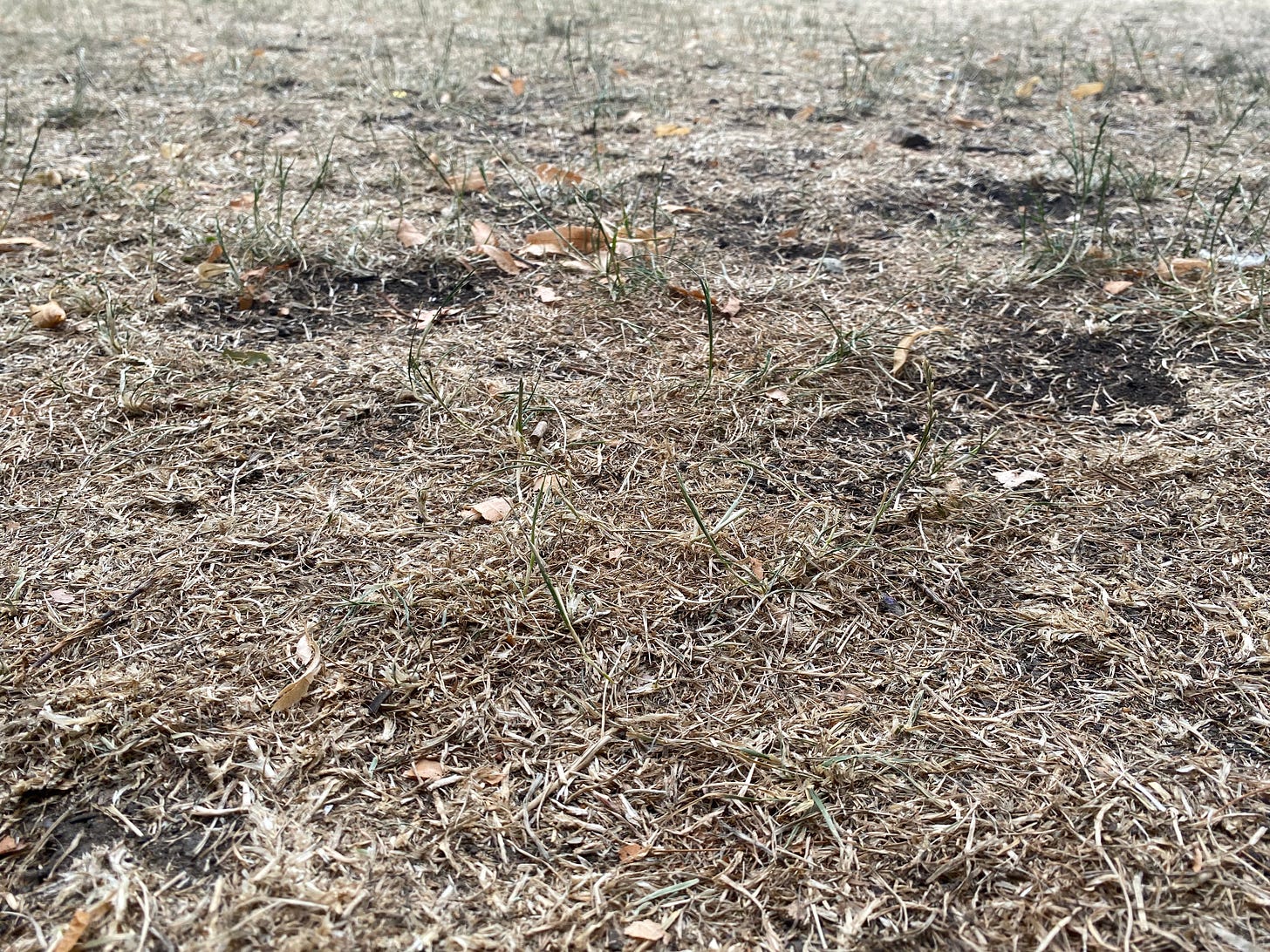If you can’t stand the heat… get out of the garden
Why I really, really, really hate it when it’s hot. Plus, ways to be more water wise
Welcome to The Earthworm, an alternative gardening newsletter. And a special welcome to new readers, of which I’m delighted to say there are a great many, owing in large part to The Earthworm being featured in Substack’s ‘What to Read’ series over the weekend – if you haven’t done so already, you can read the interview here. Whether you’re a first-time reader or a long-time subscriber, thanks for being here. I hope you enjoy today’s post.

It is hot. In the sun, in the shade, in the house, it is hot. There is no escape. No relief.
There are numbers that are used to describe precisely how hot it is, and how humid, but knowing these numbers does nothing to explain or mitigate the heat.
There are also many words to describe heat like this. Stifling. Sweltering. Oppressive. These words do go some way towards communicating the atmospheric conditions, but still fall short of capturing the cumulative impact of day after day after day of sustained solar onslaught. Especially here in London, where centuries-thick layers of concrete and brick bounce hot air about like a giant microwave, cooking human inhabitants from the inside out.
I am wearing shorts, a loose cotton t-shirt, and open-toed pool slides. A bladeless fan (not a Dyson, but a cheap imitation purchased on impulse during a previous heatwave) pushes tolerably warm air against my shins. My elbows audibly peel from my chair’s faux leather arm rests as I squirm between equally uncomfortable positions.
The doorbell rings. It is a delivery driver. At his feet stands a box containing a bladeless fan (not a Dyson, but another impulse-bought cheap imitation), acquired so that I no longer have to lug the existing one from room to room as I move around the house.
“I’m worried it’s going to be hot today,” says the delivery driver, wet beads forming on his forehead, dark patches spreading out across his polo shirt from under his armpits.
He doesn’t mention the fan; doesn’t make a joke about it. This is no time for banter. It is too hot for humour. I wonder how many identical boxes are in the back of his van.
“Good luck,” I say, unhelpfully, as he dashes off to make his next delivery.
I hate the heat. Not just because of the way it presses against my skull, slowing down all of my thoughts and my movements, but because it forces me to spend an inordinate amount of time performing my least favourite garden-based activity: watering.
Some people like watering, because it allows them to take stock of their plants; to pause and get a good look at how each individual plant is performing; to see what is coming up, and what is going over; to inform where their time in the garden would be best directed. I am not one of those people.
I water very little. In an ideal world, I would not water at all. I try to garden as sustainably as I can, and there’s no denying that irrigation using mains water is one of the most decadently wasteful things that we do in our gardens.
To put this decadence into perspective, running a sprinkler for an hour uses the same amount of water as a family of four uses in a day. And for every 15 minutes that you run your hose, you’re pumping 135 litres of water into your flowerbeds. If your home is on a water meter, as mine is, then watering can turn into an expensive habit. But even if you’re not, you’re still using a precious natural resource – one that we have come to take for granted in a historically water-rich country like the UK, but can no longer afford to do so.
As our climate continues to warm, and our summers continue to become hotter and drier, our gardens will continue to demand more water. That is the bitter irony in all of this: it is precisely in moments of drought, when water availability is at its scarcest, that our plants are most in need of a good soaking.
Or are they? As I peel back the curtain, daring to allow sunlight and heat to penetrate the room, I can see no signs in the garden borders of any suffering. Stems are upright, leaves turgid, flowers full, fruit swelling plumply. You see, counter-intuitive as it may seem, my stingy and lackadaisical approach to irrigation (accompanied by a liberal application of moisture-trapping mulch) may have actually helped the plants build up their resilience.
The more you water your plants, the more dependent they become on that hydration. If a plant can’t find water around its roots, it will direct its energy into developing and expanding those roots, sending them deeper into the earth in search of moisture. This means that during hot spells such as this one, when the sun bakes dry the top few inches of soil, those roots are able to draw on water reserves from deep underground.
If, on the other hand, a plant has grown accustomed always to being able to find water near the soil surface, then once the heat causes that water to evaporate, the plant will quickly flop over in desiccated defeat. In human terms, “treat ‘em mean, keep ‘em keen” is a deplorable way to conduct a relationship; in the garden, where watering is concerned, it is recommended.
People are obsessed with green lawns. Why? On my recent visit to Long Island, I drove down mile after mile of highway where the roadside verges were carpeted with pristine, cricket pitch-quality turf. Sprinkler systems spritzed water that, during the peak of the day’s heat, must have evaporated on impact. They may as well have been pouring that water down the drain. Here was an opportunity to create a miles-long meadow, a wildlife super highway, and instead it was maintained as a piece of pointless parkland, as thirsty as it was under-used.
At home, who cares if your lawn goes a little yellow, a little brown during a heatwave? The minute it rains, new growth will spring bright green from beneath the soil, without a drop of water wasted.
We could – and should – all be doing more to “harvest” rainwater, too. Just as we know it’s prudent to save money for “a rainy day”, we can save rainwater for a dry one. Water butts aren’t always the most attractive garden accessories, and won’t always take precedence in a small space, but are worth investigating and investing in – there are loads to choose from. The average roof in Britain could collect enough rainwater to fill 450 such butts. That’s a lot of wet butts.
But as ever, it is my garden where my own moral conflicts play out, and where my hypocrisies are exposed. I have a lot of pots, and a lot of plants growing in these pots. I don’t need as many pots as I have – my patio is more trip hazard than habitable space – and I certainly don’t need to be growing such water-guzzling species in said pots as canna lilies, sweet peas, tomatoes, or a dozen thirsty Salvia ‘Amistad’ cuttings.
But I want to grow these plants. And so I need to water them. Every single day. Despite the fact that doing so has the equivalent impact on our household water consumption as adopting a pair of adult twins, whilst also forcing me to part with both my money and my smug sense of moral superiority.
As our climate continues to warm, and water becomes an increasingly rare luxury, it is obvious that we will have to adjust our planting schemes accordingly, grower species better suited to extended periods of drought. Northern European gardens may take on a more Mediterranean feel. We will have to water less, and be smarter about where (and when) that water comes from.
And I don’t mind that. Not at all. It will be an opportunity to introduce plants into the garden that we might never previously have dreamed of growing. There might be less need for me to run the tap; less time spent hunched over with a hose in my hand. For now, though, you’ll have to excuse me. I’ve got watering to do.
If you’re looking for more ways that you can cut down on your own use of water in the garden, check out the RHS’s ‘Mains to Rains’ campaign.
How do you cope with the heat? And how about your plants? Please do share your experiences and/or advice with me and with the greater Earthworm community by leaving a comment. Thanks, and see you next time.






I am my absolute worst self when it's hot, so I really feel for you, Dan.
We water our vegetable garden (small, about 10 x 10) and that's it. Water is too expensive in our village, so we get by with native plants that do just fine (even when the agriculture crops are going through a drought, which we narrowly avoided this year thanks to a ton of spring rain).
I used to have a lot of pots, too -- we have a large deck and an even larger patio that's fun to pack with pots -- but got so overwhelmed in 2020 with, well, all of it, that I didn't plant them and somehow haven't since. I do miss them, but I don't miss watering them every damn day. I'd rather sit in my basement in my underwear and count the days until it gets dark at 4pm, my favorite time of year physically and emotionally (it really fits my temperament, if that's not already obvious 😂)
Hey Dan.
The travails of a gardener. I miss the days when a weekly shower or two could be depended on to keep the garden moist.
I hope you find some consolation for the water expense in the soul and body nutrition a beautiful garden brings.
Going out to do a rain dance now. Garden on!